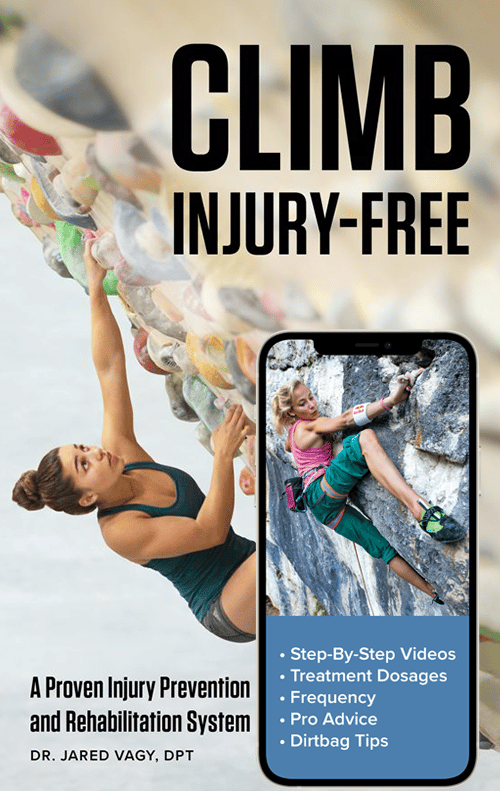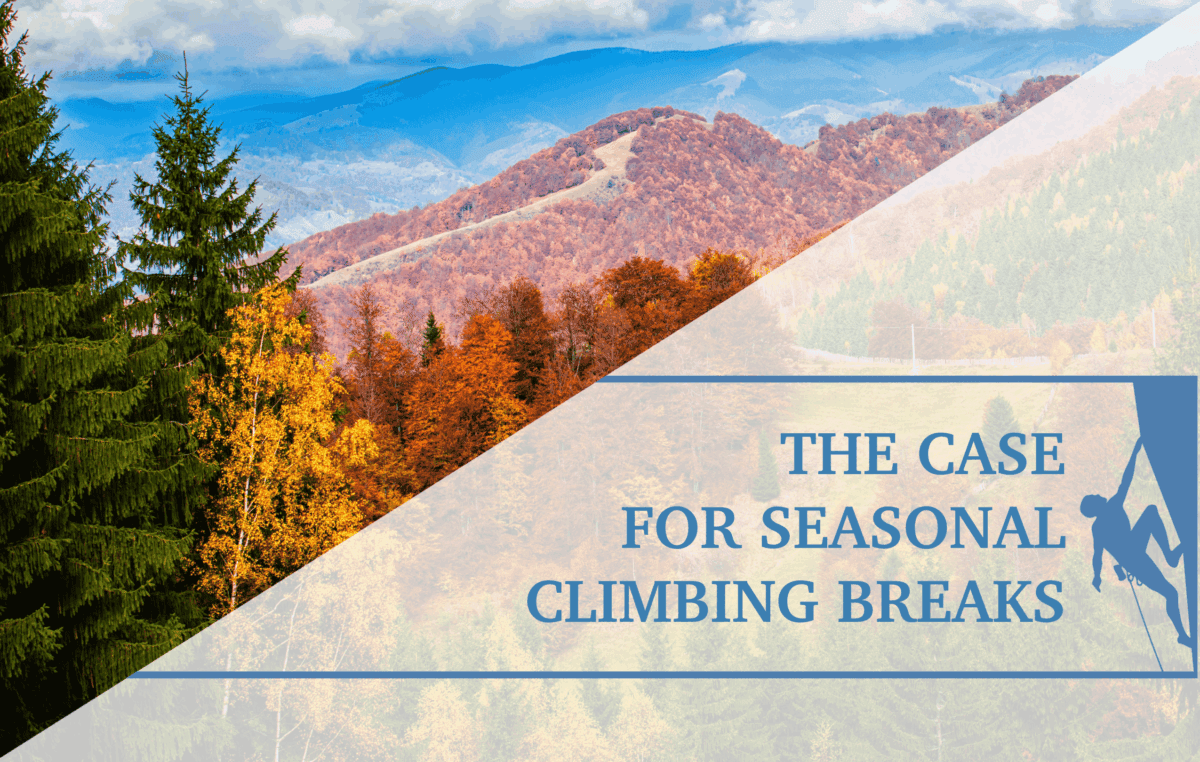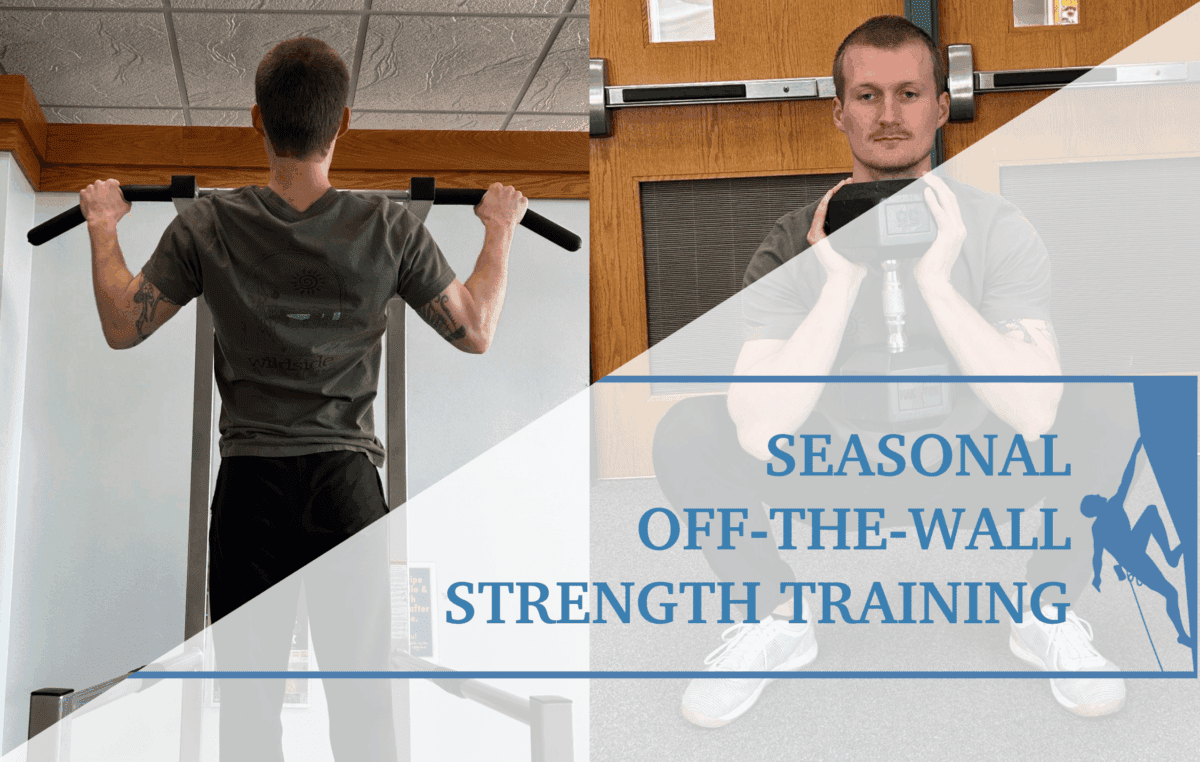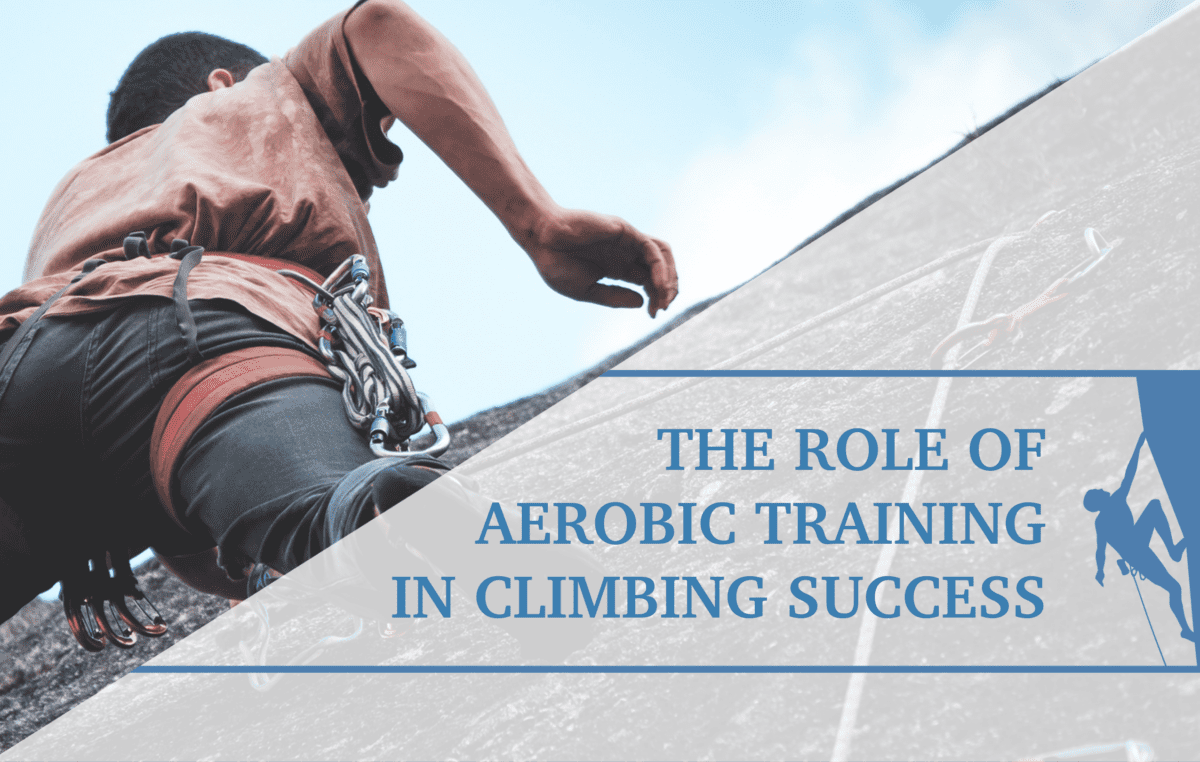Climbing as Therapy for Mental Health
After a difficult day at work, you drag yourself to go climb. You’d rather go home and sleep, but your friends expect you to join them. As you walk into the gym, the staff call out warm greetings. Lively music, cheers, and grunts of effort fill the air as you pass through in search of your buddies. Upon walking up, your group shouts greetings with offers of fist bumps and high fives. Though your mind continues racing from the day, you chalk up. Wondering if anyone notices your low energy, you start climbing. The evening goes on and the dread begins to fade as adrenaline and laughter at each other’s antics refuels you. Not all the dark clouds have left, but many have. This is where you have rest. This is where you belong.

Mental health illnesses come in all shapes and sizes, ranging from feeling down and experiencing grief, to having hallucinations or night terrors. While each diagnosis in mental health has unique impacts on an individual, they all prevent full participation in choice occupations. This appears in multiple facets. When climbing, it can present as fatigue, inhibiting your time at the gym, or promoting disinterest in even going. Perhaps it grips you when walking up to a certain style or color of holds, and herds you to the other side of the gym. Do you feel unexplainable pressure to keep your hoodie on from being “not as fit” as the other climbers around? Maybe you don’t climb, but feel stuck and just need a healthy outlet. You notice that you don’t have a nearby social support system, or you carry misgivings about gyms in general. Or possibly handling high-stress situations seems extremely difficult and causes lightheadedness. Do you have bursts of energy you just don’t know how to manage? Maybe the gym just creates a breeding ground for germs and it takes days to feel clean again after going. Sound familiar?

Whether you already have a mental health diagnosis, or just notice that something is interfering with your daily life, psychiatrists, licensed therapists, counselors, and occupational therapists can provide treatment to improve your quality of life. Occupational therapists can perform a variety of assessments and questionnaires to create a plan of care. One such assessment used is called the Canadian Occupational Performance Measurement (COPM). This takes a look at how the client’s primary area of concern specifically interferes with different areas of their life, and how they rate their satisfaction with being able to perform those daily tasks as a result. Others include the Competitive State Anxiety Inventory 2, (SAI-2), Symptom Checklist (SCL-90-R), Beck Depression Inventory (BDI-2), Minnesota multiphasic Personality Inventory, Bay area functional performance evaluation, Assessment of Motor and Process Skills (AMPS), and the Occupational Circumstances Assessment Interview and Rating Scale (OCAIRS). Specifically for concerns with depression, the Patient Health Questionnaire 9 (PHQ-9) screens for major depressive disorder, and can be taken online with a simple Google search. As a general caution, be sure to review the results of any online assessment with a professional in the field to talk through your answers.
Methods to Practice
Mental health does not always have an “exercise, rinse, repeat” to success format like many physical injuries. Research does indicate that a combination of physical and mental health promotes more successful results (Gallota et. al, Aras and Ewert, Luttenberger, Wheatley, McClung, Kleinstäuber et. al, Frühauf et. al). However, each individual may have a different road—however similar it may appear. These exercises and ideas create a starting point for those looking to add a physical component in rock climbing to enhance their mental well-being.
Mental Exercises:
Mindfulness Exercises: 5-10min of mindfulness before climbing (Luttenberger et. al, 2015 and Stelzer et. al, 2017).
- Headspace App (Wheatley, 2021): This app works through a variety of meditations for different lengths of time. It does have a use fee, but provides a simple means of adding meditations to your daily routine.
- The Rock Warrior’s Way (Ilgner, 2003) provides a number of mental exercises that climbers can do on and off the wall to increase awareness of self and increase their ability to be present in their surroundings.
- If your mental health therapist has given you exercises to try, this is a great time to incorporate those!
- Grounding, meditation, etc.
Intentional Movement Exercises:
Focused Climbing (Training Beta). Keeping your breath steady and focused will ultimately bring calmness to your body, allowing you to work through stress. This series of mental exercises can be performed while on the wall, to increase mindfulness while improving climbing technique!
- Complete Exhalation: Start with exhaling after intaking a deep breath. Exhale again before inhaling, to promote a natural belly breath (Ilgner 2003). Repeat 7-10reps before session.
- Deliberate breathing: Don’t hold your breath, but continuously breathe through your climbing. Focus on using your abdominal muscles to force the breath out. If it helps to increase focus, exhale out loud (Ilgner 2003).
Focus on the sounds in the gym or outside.
- What sounds do your shoes make? Your hands?
- Take account of the others around you. What groups of people do you hear? What music is playing?
- This type of thinking creates a greater awareness of your surroundings. If auditory input easily affects you, take time to figure out what specific sounds trigger and which sounds calm.
Focus on body awareness.
- Feel what each limb is doing. Feel your core and back tighten and release as you move on the wall. How do your toes plant on the footholds? Do all fingers hold on, or just some? What is your pinky doing?
- Think through each muscle group as you move and try to understand where it is in space.
- Visualize yourself completing the hard sections (Jones and Stuth, 2017) before each attempt.
- Research has shown over and again that rehearsing moves mentally before initiating them enhances performance.
Also, intentionally take part in climbing group meet-ups. Community creates a sense of belonging—one of the most beautiful pieces in climbing. Climbing creates a natural environment for social participation in the community it builds. Most gyms offer classes or have special events. Get out there and meet some people!
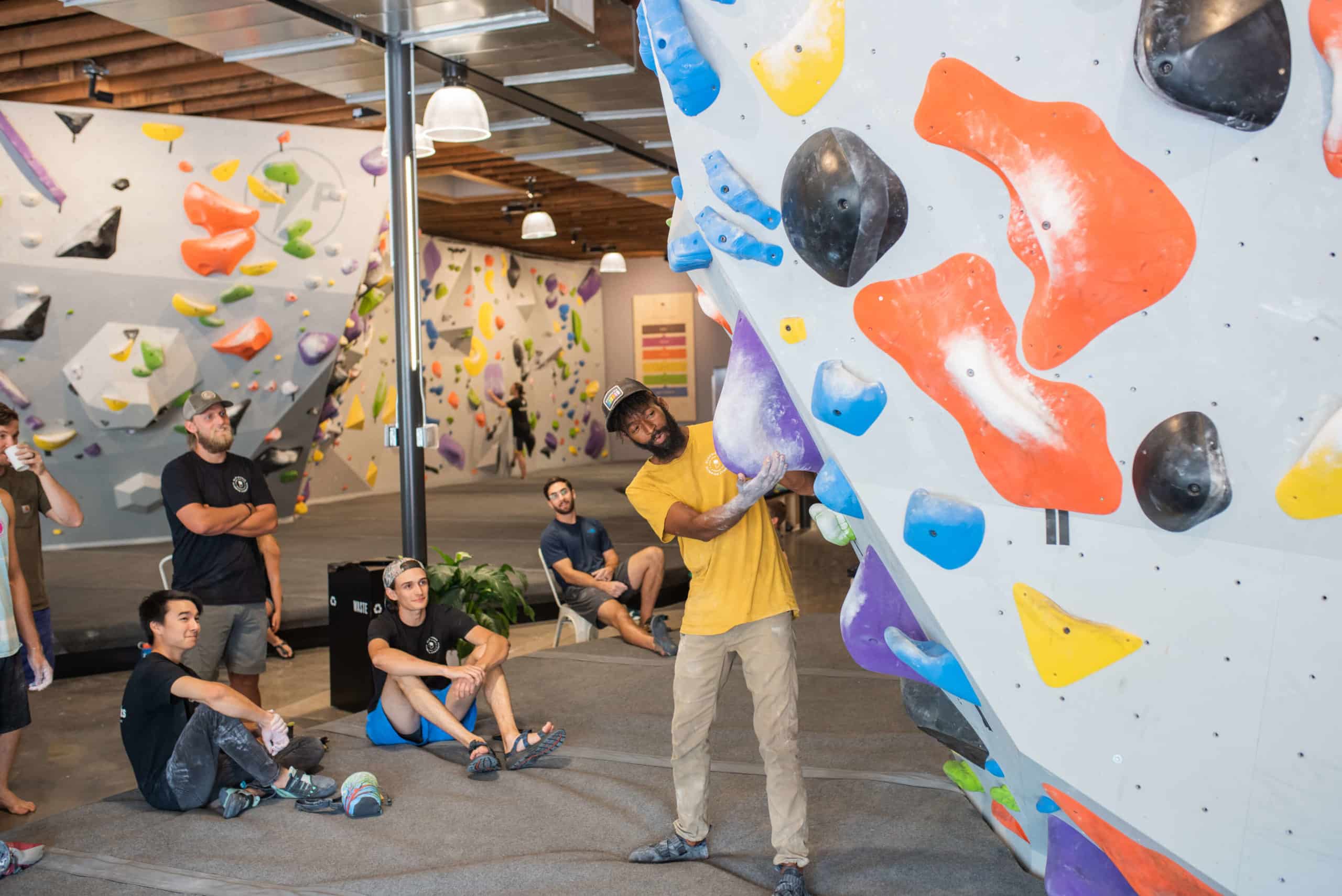
For the current climber, your model of mental training can include any of these pieces. Additionally, you may find it helpful to start a journal. Write out what you love about climbing, and what you miss experiencing. At the end of your session, write a gratitude list of every good thing that happened when you went out to climb, both on the wall and off. Experienced climbers with new anxieties may fear facing stigmas. This can affect their climbing, which can be difficult to admit. If you find yourself struggling with anxiety, depression, or other mental health concerns that directly relate to climbing, reach out to an occupational or physical therapist near you to discuss methods of incorporating mindfulness and other techniques into your training. Help is available and you are not alone!
See an Occupational Therapist
Seeing an occupational therapist (OT) when looking to incorporate climbing into a mental health routine can provide a number of benefits. OTs specialize in helping people overcome any barrier that inhibits work, leisure, or self-care in unique, contextual. and people-centered approaches. They can combine the physical aspects of climbing with the mental and emotional to ensure the addition of this occupation lasts long and continues to point toward mental healing. Additionally, they provide insight to the entire person, looking to any area that affects mental wellbeing. This can include sleep health, nutrition, time management, self-image, or spirituality and personal values. The exercises and ideas included in this blog promote a starting point. As mentioned earlier, each mental illness can appear in many different ways. Working with an occupational therapist will dig deeper into your specific inhibitions to create a plan that can help work through specific triggers and cognitive processes.
My name is Elizabeth (Beth) Scott, and I’m an Occupational Therapist recently graduated from the University of Oklahoma Health Sciences Center. I’ve been climbing for almost 9 years with experience in trad, sport, multi-pitch, bouldering, and local competitions inside and outside. I trained as a USAC-certified route setter and spent a year coaching both beginner and competitive athletes of all ages. You can find me climbing in the Wichita Wildlife Refuge most weekends, or at Threshold Climbing & Fitness during the weekdays. I can be reached at 17bethclark@gmail.com!

References

- Disclaimer – The content here is designed for information & education purposes only and the content is not intended for medical advice.

